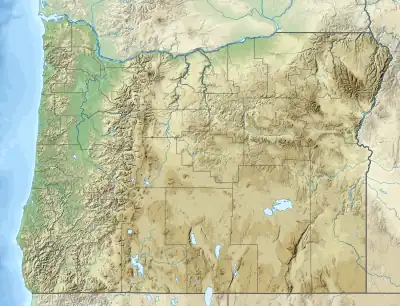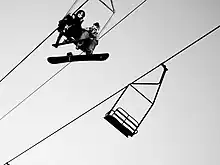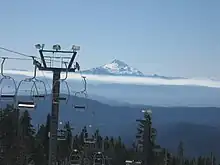| Mount Hood Meadows | |
|---|---|
 | |
 Mount Hood Meadows Location in Oregon  Mount Hood Meadows Mount Hood Meadows (the United States) | |
| Location | Mount Hood, Oregon |
| Nearest major city | Government Camp, Oregon |
| Coordinates | 45°19′44″N 121°39′45″W / 45.32889°N 121.66250°W |
| Top elevation | 7,300 feet (2,225 m) |
| Base elevation | 4,523 feet (1,379 m) |
| Skiable area | 2,150 acres (8.7 km2) |
| Runs | 87 |
| Longest run | 3 miles (5 km) |
| Lift system | 11 chairlifts |
| Snowfall | 35 feet (11 m) |
| Website | skihood.com |
Mount Hood Meadows is a ski resort on the southeastern face of Mount Hood in northern Oregon, and is the largest of the mountain's ski resorts. It is located about 67 miles (108 km) east of Portland, and 35 miles (56 km) from Hood River along Oregon Route 35. It has both Alpine and Nordic ski areas and offers night skiing, lessons and equipment rentals. There are no overnight accommodations at Mount Hood Meadows itself, but a number of hotels and motels nearby offer shuttle services to the resort. There are also condos in Government Camp.
Alpine terrain


Chairlifts
| Lift Name | Vertical | Type | Ride time | make | Year constructed |
|---|---|---|---|---|---|
| Mount Hood Express | 1,174 feet (358 m) | High-speed six pack | 4.5 min | Leitner-Poma | 2023 |
| Hood River Express | 1,400 feet (430 m) | High-speed quad | 5.5 min | Poma | 1995 |
| Shooting Star Express | 940 feet (290 m) | High-speed quad | 5 min | Poma | 1998 |
| Cascade Express | 1,391 feet (424 m) | High-speed quad | 6 min | Poma | 1993 |
| Vista Express | 1,121 feet (342 m) | High-speed quad | 5 min | Leitner-Poma | 2004 |
| Stadium Express | 581 feet (177 m) | High-speed quad | 2.9 min | Leitner-Poma | 2011 |
| Blue | 1,177 feet (359 m) | Double | 10 min | Riblet, with Lift Engineering drive | 1967 |
| Buttercup | 122 feet (37 m) | Fixed grip quad | 4 min | SkyTrac | 2017 |
| Easy Rider | 432 feet (132 m) | Double | 7 min | Riblet | 1969 |
| Heather Canyon | 705 feet (215 m) | Double | 7 min | Yan | 1996 |
| Daisy | 672 feet (205 m) | Double | 8 min | Doppelmayr | 1972 |
Trails
- 87 trails
- 2,150 acres (8.7 km2) skiable
- 15% green (beginner)
- 40% blue (intermediate)
- 15% black diamond (advanced)
- 30% double-black diamond (expert)
Elevation
- Lowest point: 4,523 feet (1,379 m) (Hood River Meadows base area)
- Main lodge: 5,366 feet (1,636 m)
- Highest chairlift serviced point: 7,305 feet (2,227 m) (summit of Cascade Express)
- Highest point reached by hiking: 9,000 feet (2,743 m)
Nordic terrain
Trails
- 9 miles (14 km)
History

In 1964, Mount Hood National Forest announced that a feasibility study was underway for a new ski area on the east side of Mount Hood. A group of Hood River businessmen, incorporated as Hood River Meadows, Inc., had raised $3,500 to finance the study. The group included Jack L. Baldwin of Cooper Spur Ski Area, L. R. Steeves, Dr. J. Allan Henderson, and Roland B. Leavens, among others.[1]
On February 28, 1966—after more than two years of publicity—the Forest Service accepted a bid from another group including John Gray, and former Mount Hood Skibowl shareholders William Rosenfeld, Russell McJury and Shepard Wilson. The permit was for two ski lifts, one T-bar lift, a rope tow, and a day lodge. The first runs were cleared late summer 1966 and the Forest Service built the two mile entrance road from Bennett Pass. Highway 35 was in the midst of a four-year straightening project to remove the quaint, tight curves and make winter snow removal practical. Until it was finished mid-1968, skiers had to drive through Hood River to reach the ski area.[1] The winter of 68/69 was one of the deepest snow falls on record, almost burying sections of the Blue Chair.
Skiers began using the resort named Mount Hood Meadows in December, 1967. Resort operators in Government Camp were uneasy due to Meadow's intense publicity and the ultra-modern facilities. This concern lasted only a few weeks, as long lift lines redistributed disenchanted guests to the other areas. The original paved parking lot had a capacity of about 330 autos, but was enlarged by 1974 to hold about a thousand.[1]
The T bar was installed on the west side of the lodge, in the lower portion of the current Daisy chairlift. The #1 chair—now called Blue—and #2 chair—called Yellow until 2007 until being renamed "Stadium", also the name of a central run below the lift—provided access to intermediate and advanced skill terrain. It was one of the two original lifts when Mount Hood Meadows opened in January, 1968. At that time, Yellow was referred to simply as "The North Lift", rising 548 vertical feet from the base area and accessing terrain in the northern portion of the ski area's permit area. The name was later changed to Yellow reinforced with painting of the chairs. For the 2007–08 season, a new drive and chairs removed the color; a naming contest resulted in it becoming "Stadium" which hosts many ski racing events each season. The new name tributes recreational skiers and snowboarders who run gates or participate in events. #3 chair was built in 1968, now Easy Rider, was called Red before the chairs were upgraded around 1995. In 1972, the T-bar was removed to build chair #4 (now Daisy).[1]
Chair #5, Texas, was finished August, 1974 and was complicated by the deep snowpack present making it necessary to bulldoze and excavate snow to place some tower footings.[1] In 1976, the Hood River Meadows (chair #6) double opened, providing a southeastern expansion into intermediate terrain along with a second base area. In 1988, CTEC constructed a fixed grip quad known as Shooting Star to service an expansion to the north of the Yellow chair area.
Texas was the first chairlift to be upgraded to a detachable, with the Cascade Express replacing it in 1993.[2] The top of Cascade Express is the highest point at the area.[2] In 1994, the Express triple chairlift, built by Doppelmayr in 1984 parallel to Blue, was upgraded and replaced by the Mount Hood Express. The Mount Hood Express reused the original lift's tower tubes.
In 1995, the Hood River Express was built to replace the Hood River Meadows lift. A year later, Hood River Meadows was reinstalled on the opposite side of the ridge as Heather Canyon, providing an egress route from expert terrain accessible off of Cascade Express and Shooting Star.[1]
In 1998, the Shooting Star fixed grip quad was replaced with a Poma high speed quad, cutting the ride time in half.
In 2004, Leitner-Poma constructed a new high speed quad known as Vista Express to service advanced beginner and low intermediate alpine terrain on the Vista Ridge, southeast of the Cascade Express pod, and supplementing the Daisy and Easy Rider lifts.
Before the 2011–2012 season, a new high-speed quad chairlift, the Stadium Express, was constructed by Leitner-Poma to replace an older lift.[3]
In 2012, Meadows installed RFID gates at every lift, to provide "hands free" access to guests, eliminating the guest complaint of having to show their lift ticket or pass to ticket scanners at every chairlift. In addition, twenty chairs were added to the Shooting Star lift, increasing its uphill capacity by 30%. In 2013, Meadows recommitted itself to an improved learning experience, dedicating more terrain to beginner and lower intermediate lessons. "Ice melt" was installed under the SE corner of the Paradise Sun Deck to allow efficient removal of snow.[4]
In 2017, SkyTrac was brought in to upgrade the Buttercup double to a fixed grip quad, servicing the beginner learning terrain and transporting guests up to the Vista Express.
References
- 1 2 3 4 5 6 John Foerste "Jack" Grauer (July 1975). Mount Hood: A Complete History. self published. ISBN 0-930584-01-5.
- 1 2 "Mount Hood Meadows". SkiLifts.org. Retrieved 2008-09-29.
- ↑ "Towers Set for New High Speed Quad at Mt. Hood Meadows". First Tracks!! Online. 30 September 2011. Archived from the original on 21 April 2012. Retrieved 1 October 2011.
- ↑ "History | Meadows". www.skihood.com. Retrieved 2017-03-09.